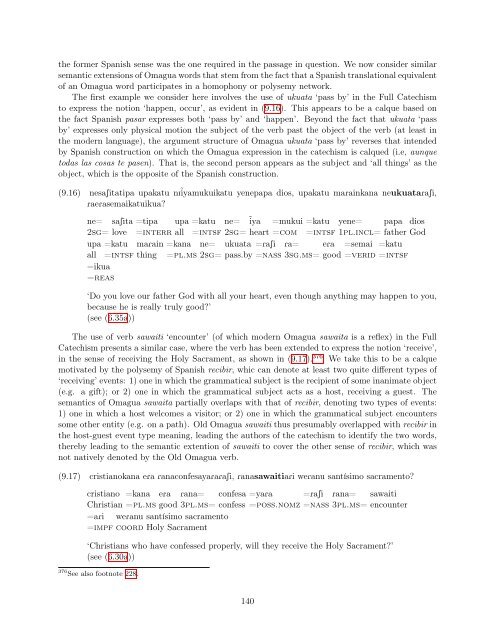draft manuscript - Linguistics - University of California, Berkeley
draft manuscript - Linguistics - University of California, Berkeley
draft manuscript - Linguistics - University of California, Berkeley
Create successful ePaper yourself
Turn your PDF publications into a flip-book with our unique Google optimized e-Paper software.
the former Spanish sense was the one required in the passage in question. We now consider similar<br />
semantic extensions <strong>of</strong> Omagua words that stem from the fact that a Spanish translational equivalent<br />
<strong>of</strong> an Omagua word participates in a homophony or polysemy network.<br />
The first example we consider here involves the use <strong>of</strong> ukuata ‘pass by’ in the Full Catechism<br />
to express the notion ‘happen, occur’, as evident in (9.16). This appears to be a calque based on<br />
the fact Spanish pasar expresses both ‘pass by’ and ‘happen’. Beyond the fact that ukuata ‘pass<br />
by’ expresses only physical motion the subject <strong>of</strong> the verb past the object <strong>of</strong> the verb (at least in<br />
the modern language), the argument structure <strong>of</strong> Omagua ukuata ‘pass by’ reverses that intended<br />
by Spanish construction on which the Omagua expression in the catechism is calqued (i.e, aunque<br />
todas las cosas te pasen). That is, the second person appears as the subject and ‘all things’ as the<br />
object, which is the opposite <strong>of</strong> the Spanish construction.<br />
(9.16) nesaSitatipa upakatu nIĩyamukuikatu yenepapa dios, upakatu maRainkana neukuataRaSi,<br />
RaeRasemaikatuikua?<br />
ne= saSita =tipa upa =katu ne= ĩya =mukui =katu yene= papa dios<br />
2sg= love =interr all =intsf 2sg= heart =com =intsf 1pl.incl= father God<br />
upa =katu maRain =kana ne= ukuata =RaSi Ra= eRa =semai =katu<br />
all =intsf thing =pl.ms 2sg= pass.by =nass 3sg.ms= good =verid =intsf<br />
=ikua<br />
=reas<br />
‘Do you love our father God with all your heart, even though anything may happen to you,<br />
because he is really truly good?’<br />
(see (6.35a))<br />
The use <strong>of</strong> verb sawaiti ‘encounter’ (<strong>of</strong> which modern Omagua sawaita is a reflex) in the Full<br />
Catechism presents a similar case, where the verb has been extended to express the notion ‘receive’,<br />
in the sense <strong>of</strong> receiving the Holy Sacrament, as shown in (9.17). 376 We take this to be a calque<br />
motivated by the polysemy <strong>of</strong> Spanish recibir, whic can denote at least two quite different types <strong>of</strong><br />
‘receiving’ events: 1) one in which the grammatical subject is the recipient <strong>of</strong> some inanimate object<br />
(e.g. a gift); or 2) one in which the grammatical subject acts as a host, receiving a guest. The<br />
semantics <strong>of</strong> Omagua sawaita partially overlaps with that <strong>of</strong> recibir, denoting two types <strong>of</strong> events:<br />
1) one in which a host welcomes a visitor; or 2) one in which the grammatical subject encounters<br />
some other entity (e.g. on a path). Old Omagua sawaiti thus presumably overlapped with recibir in<br />
the host-guest event type meaning, leading the authors <strong>of</strong> the catechism to identify the two words,<br />
thereby leading to the semantic extention <strong>of</strong> sawaiti to cover the other sense <strong>of</strong> recibir, which was<br />
not natively denoted by the Old Omagua verb.<br />
(9.17) cristianokana eRa RanaconfesayaRaRaSi, RanasawaitiaRi weRanu santísimo sacramento?<br />
cristiano =kana eRa Rana= confesa =yaRa =RaSi Rana= sawaiti<br />
Christian =pl.ms good 3pl.ms= confess =poss.nomz =nass 3pl.ms= encounter<br />
=aRi<br />
=impf<br />
weRanu<br />
coord<br />
santísimo sacramento<br />
Holy Sacrament<br />
‘Christians who have confessed properly, will they receive the Holy Sacrament?’<br />
(see (6.30a))<br />
376 See also footnote 228.<br />
140
















